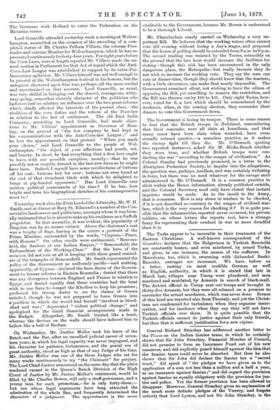Lord Granville attended yesterday week a meeting at Wolver- hampton,
assembled on the occasion of the unveiling of a com- pleted statue of Mr. Charles Pelham Villiers, the veteran Free- trader and veteran Member for Wolverhampton, which he has re- presented continuously for forty-four years. For eight years before the Corn Laws, were at length repealed Mr. Villiers made the an- nual motion in Parliament for that Act of repeal which the Anti- Corn-Law League was established to support by its extra-Par- liamentary agitation. Mr. Villiers himself was not well enough to be present at the Wolverhampton festival in his honour, but the eulogium showered upon him was, perhaps, all the more cordial and unrestrained on that account. Lord Granville, as usual, was very skilful in bringing out the shrewd, courageous, witty, easy-going, somewhat slovenly character of the politician who had exercised so salutary an influence over the two great reforms which chiefly affected the interests of the poorest class,—the abolition of the corn duties and the reform of the Poor-law in relation to the law of settlement. The old East India Company, according to Lord Granville, had made objec- tions to Mr. Villiers' appointment as Governor of Bom- bay, on the ground of "the low company he had kept in his communications with the Anti-Corn-law League ;" and he lost the appointment on that ground. "When you made your choice," said Lord Granville to the people of Wol- verhampton, "the object of your affections had youth, wit, and beauty. In short, he had everything that a first love ought to have, with one possible exception, namely,—that he was possibly not so smartly dressed in the last new dress as he might
have been. Indeed, I myself have some recollections of buttons off his coat : buttons lost for ever : buttons not even found at the end of that trenchant blade with which he delighted to lunge at pig-headed opponents." Has Lord Granville ever written political memoranda of his time ? If he has, how bright and terse his biographical sketches of his contemporaries must be


































 Previous page
Previous page